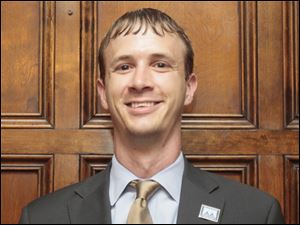
Medicaid stigma keeps some from seeking aid
8/7/2011
Justin Moor is vice president of communications and operations at the Area Office on Aging.
Many people who do not fall into the low-income category reject the idea of going on Medicaid as they age, become frail, and in need of home and health services that Medicaid programs provide.
Medicaid is a federal health-care program for the poor, and elderly people who work all their lives often don't believe it's for them. In fact, many of them are insulted when anyone suggests that they apply for it. And the idea of applying for Medicaid, public assistance, or "government aid" doesn't make it any better when they learn that Medicare -- the federal health-care program for the aged -- does not pay for the long-term care needs of aging citizens.
For anyone who does not have private funds or insurance to pay for long-term care, Medicaid pays the bill. And senior citizens who worked all their lives and who may have a little money saved can still apply to Medicaid to get help with their personal and home care.
Northwest Ohio Area Office on Aging officials say that it's unfortunate for senior citizens to live in denial and refuse help through the PASSPORT program just because it is funded through Medicaid. Moreover, when the elderly are not honest with themselves and try to get along without outside assistance, they put themselves at risk, said Justin Moor, vice president of communications and operations.
READ MORE: More ailing, aging loved ones are being cared for by relatives
When it costs $62,000 a year to house a nursing home resident, and it costs PASSPORT about a third of that much to care for an elderly person in a private home, it makes sense for aging citizens and their families to revisit the subject to review available options.
Pam Wilson, vice president of long-term care at the Area Office on Aging, said the goal is to make sure people know their options and the costs.
Potential PASSPORT applicants also tend to get hung up by the estate recovery program. It is designed to allow the state to recoup funds invested in a person's care after he or she is deceased. Some homeowners, for instance, are especially hesitant about applying for PASSPORT for fear that the state will take their homes after they die.
But Ohio only seeks to obtain the amount of proceeds from a person's estate that it paid out for care. If there is a surviving spouse, the state does not evict him or her to put the house up for sale.
Ms. Wilson noted that the estate recovery program also applies to long-term care residents in nursing homes who are on Medicaid.
"Medicaid is trying to make sure the state is not being exploited and that money is being put toward a person's care and that taxpayers are not footing a bill [unnecessarily]," Mr. Moor said.
"I understand that sentiment or emotional tie to a house," he said. Nevertheless, he urges individuals and families to get the assistance that PASSPORT offers.